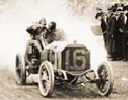Book Review
by Russell Jaslow
Real Road Racing, The Santa Monica Road Races
by
& Phil Harms
In the early part of this century, road racing, not oval racing, was king of the sport. Two
events ruled that era -- the Vanderbilt Cup and the American Grand Prize. Out of the areas
that staged races at that time, four of them stood above the others -- Long Island, Savannah,
Milwaukee, and Santa Monica.
Though books have been written that included chapters on this subject matter, very few have
dedicated themselves to this era of road racing, and even fewer to any of the specific locales.
There was The Great Savannah Races by Julian K. Quattlebaum, M.D., and now there is Real
Road Racing, The Santa Monica Road Races by Harold Osmer and Phil Harms.
If you are an aficionado of this period of auto racing, run out and buy this book. If you have a
passing interest, or wish to learn what racing was like back then, this is a worthy addition to
your bookshelf.
The book is aptly named, as this was real road racing in every sense of the word. A far
cry from the street events of modern racing. And far more dangerous. As the authors write,
"Welcome aboard for a race through time when wooden spokes, volatile fuels, no seat belts, and
hair-for-helmets were the order of the day!"
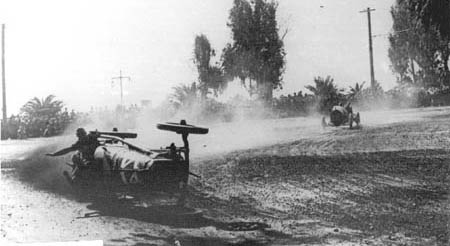
1914: This photo clearly shows the dangers of racing in the early years.
Miraculously, John Marquis and his riding mechanic, Harry Hough, escaped without serious injury
when their Sunbeam flipped three times during the Grand Prize event.
|
The races started out as a local affair supported by local car dealers looking to sell their
inventory. The first race was held in 1909, and the beautiful course, perfect crowd control,
and safety record immediately garnered the attention of the national racing scene.
The event quickly grew from that local flavor into attracting top flight drivers and cars.
This included the likes of Ralph DePalma, Barney Oldfield, Dario Resta, Johnny Aitken,
Caleb Bragg, David Bruce-Brown, Earl Cooper, Joe Dawson, Harry Grant, Howard Wilcox, and Eddie
Rickenbacker. Marmom, Mercedes, Mercer, Stutz, Duesenberg, Locomobile, Peugeot, FIAT, and Lozier
were examples of machines that sped around the track.
As accolades of the track spread, it wasn't too long before Santa Monica was
seriously considered a spot worthy of top national events. And in 1914, they were awarded the
Vanderbilt Cup and Grand Prize events. They were given these two races again in 1916.
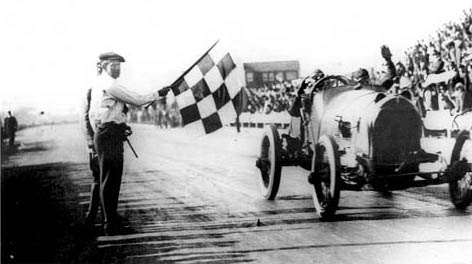
1914: Eddie Pullen in his Mercer takes the checkered flag in the American Grand
Prize. This was the first year the checkered flag was used to signal a winner at Santa Monica.
|
After WWI interrupted national races in most parts of the country, Santa Monica had one last
gasp staging road races in 1919. However, the writing was on the wall, and the races had outlived
their usefulness.
The authors recall this period of racing in a straightforward strictly chronological manner.
Interspersed amongst the text are the actual accounts from the newspapers and magazines of the
day such as the Los Angeles Times, Santa Monica Daily Outlook, Horseless Age, The Automobile,
Motor Age, and Speed Age. This method works very well.
Perhaps even better than the text are the photos which are nothing short of stunning. The
spectacular quality of these pictures after all these years makes you feel like you've been taken
back in time and are participating in the event yourself. Most of them are taken from Phil Harms'
personal collection which contains over 8,000 photos.
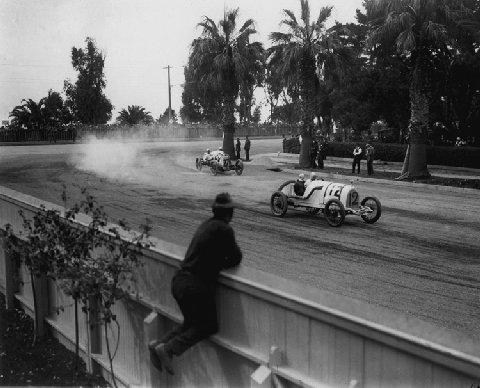
1916: A soldier kneels on the wall watching the action around Dead Man's Curve.
Here, William Bolden leaves Omar Toft literally in the dust.
|
There are a couple of quibbles I have with the book. There are far too many typographical errors.
This, unfortunately, is typical of self published books. It causes one to wonder how many factual
errors have also slipped into the book that the reader isn't aware of. This is a shame since
the authors' expertise and research are impeccable. Osmer's first book was Where They Raced
a reference of every extinct racing venue that ever existed in the greater Los Angeles area.
Harms has a database of results that includes over 9,000 American open wheel races from 1896 to
present and is currently assisting Omega Timing's web site in archiving all CART results. I
personally did not spot any factual errors with the subject matter I am familiar with.
Also, the authors tend to repeat stuff when it is not needed. But these two minor faults do not
take away from your enjoyment, and they should not stop you from reading the book.
Real Road Racing, The Santa Monica Road Races takes you to an era when men were men.
To an adventurous time where race car drivers were looked upon as daring, courageous, death
defying souls similar to the way aviators would soon be viewed, and then astronauts. Harold
Osmer and Phil Harms do a wonderful job of taking you back to that exciting yet dangerous time.
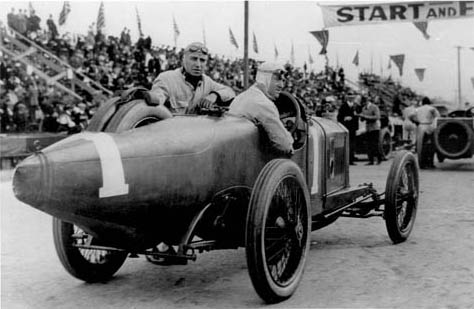
1916: Dario Resta, at the wheel, lining up for the start. Resta would win the
Vanderbilt Cup, six months after winning the Indy 500, and would claim the AAA National
Championship. The year before, Resta won both the Vanderbilt Cup and Grand Prize races at San
Francisco.
|
Copyright © 1999 by . All Rights Reserved.
All photos from the collection of
.
|


